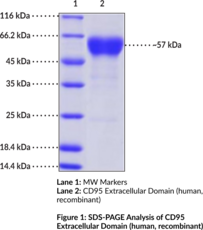Territorial Availability: Available through Bertin Technologies only in France
- Correlated keywords
- AA CD 95 nonapoptotic NF?B nonmalignant 1 a IgG 1 Ig G1 Gln 26 SDSPAGE
- Product Overview:
CD95 is a type I transmembrane glycoprotein receptor encoded by the FAS gene in humans.{49679} Alternative splicing of FAS generates a soluble form of the protein. CD95 is expressed by activated T and B cells and thymocytes, and has been found in the thymus, liver, heart, and kidney.{49678,49681,49682} CD95 is involved in the induction of apoptosis, as Fas ligand activation of CD95 leads to formation of a death-inducing signaling complex (DISC) comprised of CD95 oligomers, the Fas-associated death domain protein (FADD), procaspase-8, procaspase-10, and c-FLIP.{49683} DISC formation and CD95 internalization is rapid in type I apoptotic cells, where it is associated with plasma membrane lipid rafts, and delayed in type II apoptotic cells, where it is found in both lipid raft- and non-raft regions of the membrane.{49684,11907} CD95 has non-apoptotic activity as well, including activation of the NF-?B signaling pathway and inducing renal tubular epithelial cell migration, among others.{49682} Inhibition or activation of CD95 reduces or promotes cancer cell functions, respectively, in vitro and in vivo in animal models. However, high serum levels of CD95 in patients with various cancers are associated with metastasis, progression, and shorter survival. Mice lacking the gene for CD95 develop spontaneous autoimmunity and have been used as a model of systemic lupus erythematosus (SLE). Mutations in FAS are associated with various cancers and autoimmune lymphoproliferative syndrome (ALPS) type 1a, which is characterized by non-malignant lymphadenopathy and splenomegaly.{49682,49684} Cayman’s CD95 Extracellular Domain (human, recombinant) protein can be used for cell-based assay applications. This protein is a disulfide-linked homodimer. The reduced monomer, comprised of CD95 (amino acids 26-173) fused to IgG1 Fc at its C-terminus, consists of 386 amino acids, has a calculated molecular weight of 43.4 kDa, and a predicted N-terminus of Gln26 after signal peptide cleavage. As a result of glycosylation, the monomer migrates at approximately 55 to 60 kDa by SDS-PAGE under reducing conditions.
Cayman Chemical’s mission is to help make research possible by supplying scientists worldwide with the basic research tools necessary for advancing human and animal health. Our utmost commitment to healthcare researchers is to offer the highest quality products with an affordable pricing policy.
Our scientists are experts in the synthesis, purification, and characterization of biochemicals ranging from small drug-like heterocycles to complex biolipids, fatty acids, and many others. We are also highly skilled in all aspects of assay and antibody development, protein expression, crystallization, and structure determination.
Over the past thirty years, Cayman developed a deep knowledge base in lipid biochemistry, including research involving the arachidonic acid cascade, inositol phosphates, and cannabinoids. This knowledge enabled the production of reagents of exceptional quality for cancer, oxidative injury, epigenetics, neuroscience, inflammation, metabolism, and many additional lines of research.
Our organic and analytical chemists specialize in the rapid development of manufacturing processes and analytical methods to carry out clinical and commercial GMP-API production. Pre-clinical drug discovery efforts are currently underway in the areas of bone restoration and repair, muscular dystrophy, oncology, and inflammation. A separate group of Ph.D.-level scientists are dedicated to offering Hit-to-Lead Discovery and Profiling Services for epigenetic targets. Our knowledgeable chemists can be contracted to perform complete sample analysis for analytes measured by the majority of our assays. We also offer a wide range of analytical services using LC-MS/MS, HPLC, GC, and many other techniques.
Accreditations
ISO/IEC 17025:2005
ISO Guide 34:2009
Cayman is a leader in the field of emerging drugs of abuse, providing high-purity Schedule I-V Controlled Substances to federally-licensed laboratories and qualified academic research institutions for forensic analyses. We are certified by ACLASS Accreditation Services with dual accreditation to ISO/IEC 17025:2005 and ISO Guide 34:2009.





